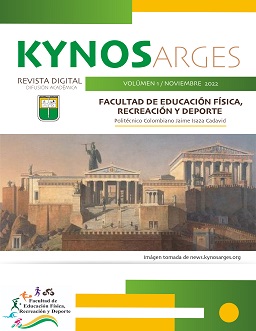Social sports as a peace-dynamic agent in post-conflict times
Keywords:
social sport, peace, territory, conflict, subjectAbstract
Talking about social sport allows you to navigate through the dynamic and complex world of peace, in scenarios such as the Colombian one, which is configured as a permanent commitment, and is a theme and space that is built day by day. Due to the philosophy that sports and permanent interaction with the subject keep inside, it is the perfect way and route to group groups, generate connections and establish the sports arena «the field» as the perfect territory for its dynamization, consolidation and follow-up.
Throughout the investigative process, the sport known in education, training, competition and recreation is not only analyzed, but also as the actor that permanently groups, builds and deconstructs to fulfill its social mission. The objective is to make social sport visible as a dynamic agent for peace; and is accompanied by the question of Is it possible that Social Sport contributes to the revitalization of peace in post-conflict times?
The concretion of the information is achieved from an interpretative qualitative documentary research, which allows to evidence from the bibliographical search the importance in the field of social sciences, sports and physical activity as a dynamic mechanism in the territory, which that contributes and contributes to the reconstruction of the social fabric from the consolidation of competencies, the management of its founding elements and the interaction of the being as a subject that interacts constantly.
Article Metrics
Abstract: 542 PDF (Español (España)): 358References
Alabarces, P. (1998). ¿De qué hablamos cuando hablamos de deporte? Nueva Sociedad, 154, 74-86.
Bernate, J., Fonseca, I., Urrea, P., & Amaya, G. (2019). La educación física y el deporte social para la paz y el posconflicto en Colombia. EmásF: revista digital de educación física, (61), 33-47.
Cabello Tijerina, P. A., & Sierra García, L. G. (2016). “Lauream Pacis”: Una Cultura de Paz a través del deporte. Comunitania: revista internacional de trabajo social y ciencias sociales, 11, 141-155.
Capllonch Bujosa, M., Figueras, S., & Lleixà Arribas, T. (2014). Prevención y resolución de conflictos en educación física: estado de la cuestión. Retos. Nuevas tendencias en Educación Física, Deporte y Recreación, 2014, 25, p. 149-155.
Chadi, M. (2000). Redes sociales en el trabajo social.
Cruz Velazco, J. E. (2018). La calidad de vida laboral y el estudio del recurso humano: una reflexión sobre su relación con las variables organizacionales. Pensamiento & Gestión, (45), 58-81.
De Vera, F. H. (2016). La construcción del concepto de paz: paz negativa, paz positiva y paz imperfecta. Cuadernos de estrategia, (183), 119-146.
Díaz, J. T. C. (2015). Deporte y posconflicto: una opción para la convivencia. Imaginar la paz en Colombia, 72.
Franchella, Jorge. (19 de enero 2019). Deportes recreativos, competitivos o de alto rendimiento: ¿cuál es la diferencia?. https://tn.com.ar/salud/fitness/deportes-recreativos-competitivos-o-de-alto-rendimiento-cual-es-la-diferencia_933028/
Gómez-Henao, D. E., Parra-Sánchez, A. M., & Jiménez-Domínguez, A. G. (2020). Perspectiva del deporte social en doce planes de estudio de formación en el área de deporte. Lúdica Pedagógica, 1(32), 1-22.
Guette, M., Cruz, N. B., & Hernández-Peña, Y. K. (2019). El deporte como intervención del tejido social para la paz: estado del arte. Archivos Venezolanos de Farmacología y Terapéutica, 38(5), 674-681.
Ministerio del Deporte de Colombia. (2010), Deporte Competitivo. https://www.mindeporte.gov.co/index.php?idcategoria=37276
Perspectiva del deporte social en doce planes de estudio de formación en el área de deporte. Lúdica Pedagógica, 1(32), 1-22.
Reyes, F. G., & Dávila, E. G. (2021). Estudios de Caso: una caracterización metodológica. Ecos de la academia, 7(14), 10-10.
Sarni, M., & Noble, J. (2019). Del deporte y su enseñanza. Montevideo: Ediciones Universitarias. U. de la R. CSEP. En prensa (Arbitrada por evaluadores externos y nacional).
Tancara Q, Constantino. (1993). La investigación documental. Temas Sociales,(17),91-106. http://www.scielo.org.bo/scielo.php?script=sci_arttext&pid=S0040-29151993000100008&lng=es&tlng=es.
Triviño, J. L. P. (2011). Ética y deporte. Desclée de Brouwer.
Vain, P. D. (2012). El enfoque interpretativo en investigación educativa: algunas consideraciones teórico-metodológicas. Revista de educación, 4(4), 37-45.
Zagalaz Sánchez, M. & Romero Granados, S. (2002). Deporte para la guerra, versus deporte para la paz. Reflexiones sobre el carácter educativo del deporte. Revista Electrónica Interuniversitaria de Formación del Profesorado, 5(2). 1-7 http://www.aufop.org/publica/reifp/02v5n2.asp
ZUbiRi, X. (1972). La dimensión histórica del ser humano. Realitas I, 1973, 11-69.
Downloads
Published
Issue
Section
License
Copyright (c) 2022 Leonardo Rodas Rodríguez, Adriana María Ruiz Restrepo, Alex Nilson Meneses Oquendo

This work is licensed under a Creative Commons Attribution-NonCommercial-ShareAlike 4.0 International License.

